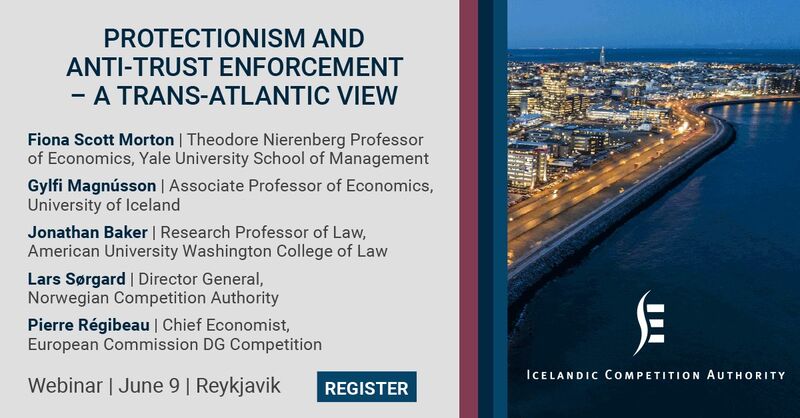Protectionism and anti-trust enforcement – a trans-Atlantic view
The Icelandic Competition Authority invites you to a webinar with Jonathan B. Baker, keynote-speaker, and Fiona Scott Morton, Gylfi Magnússon, Lars Sørgard and Pierre Régibeau that will discuss three topics:
- Anti-trust development in Europe and the US. Can the US learn from the EU or vice versa?
- Which arguments are for and against an increased emphasis on the creation of national champions?
- To what extent is it likely that the current economic crisis will be met with protectionism and a more relaxed competition enforcement? How should competition authorities react?
Registration here
9th of June
| 13:00-13:05 |
Introduction Páll Gunnar Pálsson | Director General, Icelandic Competition Authority |
| 13:05-13:25 |
Keynote speaker Jonathan Baker | Research Professor of Law at American University Washington College of Law |
| 13:25-14:30 |
Panel
Moderator:
|
Background
During previous economic downturns, countries have occasionally responded to the contraction with protectionism and lenient anti-trust enforcement. Even though experience has shown such actions to be harmful and counterproductive, the siren calls for protectionism can be heard today.
A related matter is the renewed focus among some policymakers in the EU on the need that merger enforcement does not hinder the creation of “national champions” and even “global champions”. The main argument is that only such firms can compete in international markets. Some have argued that the application of EU competition law has been too focused on competition in Europe. In contrast, other countries such as the US, South Korea, Japan and China have seen the benefit of creating and fostering global champions.
A further topic is a discussion in the US, whether lax anti-trust enforcement has harmed consumers and businesses. A number of academics have stated that a reversal is needed to restore a competitive economy.
These issues will surely be important when policymakers begin to discuss, and design strategies to deal with the economic aftermath of the COVID-19 pandemic.
